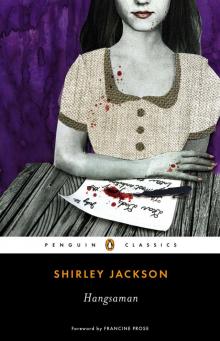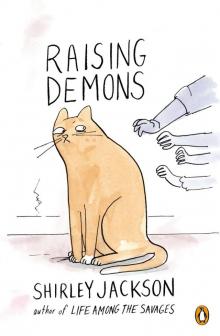- Home
- Shirley Jackson
Let Me Tell You: New Stories, Essays, and Other Writings Page 26
Let Me Tell You: New Stories, Essays, and Other Writings Read online
Page 26
When he got off the train, the vague feeling of apprehension that had followed him all the way from camp turned into an acute, embarrassed terror; he stood on the station platform wondering where he could turn and run to, and someone passed him, looked at him curiously, and said, “Back again, Bert?” Then he knew it was too late, and without thinking he started down toward his home.
He passed the candy store and wondered briefly if it would be worthwhile taking her a box of toffee, but then, feeling the bulk of the bracelet in his pocket, he thought, No, that’s enough, maybe I’ll get her something else later. Within a block of his home he met his ten-year-old brother-in-law, and the kid grinned and said, “Hi, Bert, what you doing home?”
“Just back for a day or two,” Bert said uncomfortably, hurrying past; the kid would certainly tell the whole town he was back.
“She ain’t home; her and Ella’s down at the Paradise,” his brother-in-law bawled after him as he reached his front gate; he opened it and went up the steps two at a time. The door was unlocked. As he pushed it shut behind him, he said tentatively, “Gladys?”
There was mail on the dining room table, put down hastily: a letter for her from his mother, a couple of bills. Bert turned his mother’s letter over in his hands for a minute and then put it down again; he knew what it said. He went into the kitchen; she had had a cup of coffee that afternoon; the coffeepot was still faintly warm under his hand. There was a package of bacon in the refrigerator, and a couple of eggs. Breakfast, he thought, and went on into the bedroom. The bed was mussed, and a magazine lay facedown, with half a chocolate bar on its cover. Her housecoat was on the floor of the closet. He left the bedroom and walked back through the kitchen, stopping to look into the bathroom (her powder box still open and a bath towel on the floor), and then into the living room again. “Gladys?” he called softly once more, his hand on the front door. Then he went out into the street again, walking quickly and lightly, his small feet moving with certainty along the familiar sidewalk.
The Paradise was far enough away so that by the time Bert had walked there he was quieted, and his hands were no longer shaking. He lit a cigarette, standing outside the double door, and then he went in. It was an orderly place, well swept and dark, with a bar at the front and booths in the back. It was nearly deserted by now; the respectable people who drank here had gone home to their dinners, and the unrespectable people had gone on to livelier, brighter places. He stood for a minute to get used to the darkness, and heard Gladys’s voice clearly: “But I’m not hungry.”
She was near the back, sitting in a booth with her sister, Ella, and Ella’s friend Frank, and a man Bert didn’t know. Bert walked softly back and stood at the entrance of the booth, looking at them for a minute before Ella recognized him in the near dark. “It’s Bertie,” she shrieked. “Bertie’s home again.”
“Hey, soldier,” Frank said cheerfully, “the war’s over. Didn’t they tell you out there in the sticks?” He reached out his foot and pulled a chair to the table. “Sit down, Corporal,” he said. “Let’s get you a beer.”
They were all drinking beer. Bert looked at Gladys, and she said, “Hello, Bertie,” and smiled. The man sitting next to her looked at him and said, “Hi.”
“How come you’re back?” Frank asked. “What you doing home again so quick? They can’t stand him around that Army,” he told Ella. “They keep sending him home.”
“I don’t blame them,” Ella said, and giggled.
“You didn’t write,” Gladys said to him. “I would have known you were coming if you wrote me.”
“Well, it’s good to see you,” Frank said. “You know Walter, here?” He pointed to the strange man.
“Hi,” Walter said.
“Look, Gladys,” Bert said, “why don’t we go on home? I got a lot to talk to you about.”
The corners of Gladys’s mouth turned down, and she put her head back and drew up her shoulders. “I can’t,” she said. “I want to stay here.”
“You’re not going to start that again, are you, Bert?” Ella demanded. “Because if you are, I’m leaving. Frank and I’ll go someplace else where we don’t have to listen.”
“I’m not doing anything,” Bert said. “I just want to talk to my wife, is all.”
“I don’t want to talk,” Gladys said. “I want to stay here.”
“And that’s that,” Frank said. “Have a beer, Bert.”
“He hasn’t any right,” Ella was saying to Walter. “He just can’t stand seeing anyone have a nice time.”
“Bert isn’t going to be mean anymore,” Gladys said. “Listen, Bert, you go along home and I’ll be there in…” She thought. “In an hour.”
“Why should he go home?” Frank put his hand affectionately on Bert’s arm. “Let him stick around and have a drink.”
“Go on up to Mom’s,” Ella said. “She’ll give you something to eat.”
“I saw your brother,” Bert said to Gladys. “He told me where you were.”
“He followed us,” Gladys said. “Walter gave him a dollar.” She laughed. “Like in the comics.”
The waiter brought a glass of beer and put it on the table in front of Bert, and Frank paid for it. “I’m buying you a beer, Corporal,” he said.
Bert hesitated for a minute, then sat down wearily. “Look, Gladys,” he said, “I’m just here for a couple of days. You ought to listen to what I have to say.”
“I’m listening,” Gladys said. She leaned forward, her chin on her hands. “See?” she said.
“All right, dammit,” Bert said. He put his hands on the table and looked at them through the glass of beer; he had small hands, hardly larger than Gladys’s. That’s why I don’t knock one of these guys down, he thought. I’m not scared; it’s just that I’m not much bigger than Gladys. He looked at her and saw that she was winking at Ella. “I guess I’m going to get a divorce,” he said. “My mother thinks I ought to divorce you.”
“What for?” Gladys asked blankly. When all the excitement went out of her face it was little and pale, like a rabbit’s, or like the face of some small, staring fish.
“Divorce Gladys?” Ella said. “What would she do?”
“She could go back and work in the factory,” Bert said. “It wouldn’t have anything to do with me anymore.”
“That’s no way to talk,” Frank said. “You’re not being fair to Gladys.”
“But I didn’t do anything,” Gladys said.
Bert looked down at his hands again instead of looking at Gladys, and he spoke very slowly and carefully so that nobody would make any mistakes about him. “My mother says our getting married was a mistake, and that when I’m out of the Army you won’t settle down and we shouldn’t try to stay married. And we were only married for a few days before I left, so it isn’t as though…” He stopped helplessly, then began again: “So they gave me an emergency furlough.” He looked at Gladys. “That means trouble at home. You think I like chasing you into every bar in town?” he finished desperately.
Gladys’s lip trembled. “I didn’t do anything,” she said. “I write you every single week, and I tell you every single thing I’ve been doing. It’s not nice to talk like that.”
“Why don’t we go someplace else?” Walter asked suddenly. “I want to eat.”
Ella began to talk across the table to Walter again. “You know what people are going to say about a girl Gladys’s age who gets divorced by her husband, and it isn’t very nice to think of people talking like that about your own sister.”
“You see why I wanted to go home?” Bert said. “This is no place to talk about something serious.”
“Seventeen,” Ella went on, her voice rising. “Only seventeen years old, my sister is. And what are people going to say?”
Walter stood up and reached for his coat on the rack. “I’m going someplace and eat,” he said. Dragging his coat after him, he started for the door.
“Let’s all go,” Ella said. “We can talk later.” She shoved
impatiently at Frank to get him to let her out of the booth, and Gladys slid along the seat on her side to get out. Bert caught her by the arm. “Listen, Gladys,” he said softly. “Let them go wherever they want to. We’ll go home.”
She pulled her arm away, not looking at him, and he said desperately, “I’ll be gone by tomorrow night.”
“Come on, Gladys,” Ella said. “You can bring Bert.”
“Look,” Bert said to Gladys, “I thought we could go to the hotel for dinner. It’s Saturday; we could dance, too, for a while.”
Gladys looked at him. “I don’t want to,” she said.
“I brought you a bracelet,” Bert said. “I didn’t want to give it to you with all of them watching.” He touched her arm again. “Listen, Gladys,” he said, “I’m just going to be here for one night.”
“Wait a minute, then,” Gladys said ungraciously, and hurried to catch Ella. They talked for a minute while Walter waited impatiently at the door, and then Gladys said, “See you Monday, at my place,” and came back to Bert.
“It’s okay,” she said. “Ella doesn’t mind. They’ll get someone else for Walter.”
He took her coat down and held it for her to put on. “You’ll like it down at the hotel.”
She turned the corners of her mouth down again. “You said…” she began.
“Okay, okay,” Bert said quickly.
When they got out to the street it was dark, and Ella and Frank and Walter were already out of sight. Gladys started walking toward the brighter part of town, toward the hotel, and Bert caught up with her. “We’ve got to talk about this, though, seriously,” he said insistently.
She looked up at him and smiled. Then, as they walked along, she curled her hand under his arm and leaned up against him affectionately.
“Nice old Bert,” she said.
Homecoming
Judith walked up the subway stairs and into the daylight with the tired, anticlimactic feeling that comes after something exciting and final is over. She tried to make herself believe that it was because she had gone to a movie, strangely, alone in the afternoon, instead of in the evening with the girls from her office. The next movie she went to, she thought suddenly, she would be with her husband again, sitting beside him in the darkness after such a long time.
She walked quickly down the street and stopped in front of her market, watching to see if her son, Robbie, was visible. He would be wearing his little blue overalls that fit like a sailor’s pants, and he would be accompanied by Judith’s friend Sally, who picked him up every afternoon after nursery school and watched over him until Judith got home.
After looking around for a minute, Judith turned and entered the market, thinking that shopping early might be easier, before the market’s usual six o’clock rush. The market was almost empty; no one in this neighborhood shopped at four in the afternoon; they were there either at ten in the morning, if they were home during the day, or after five-thirty, on their way back from work. At the meat counter Judith stood uninspired before the trays of meat.
The butcher came toward her cheerfully. “What can I do for you?” he asked, smiling.
Judith smiled. “I wish I knew,” she said. “What shall I have for dinner?”
“Nice chops?” the butcher suggested. “Some very nice pork chops.”
“No, thanks,” Judith said.
“Liver?”
“Give me a little piece for the baby,” Judith said. She hesitated. “I want a roast,” she said. “A chicken, maybe.”
The butcher was reaching into the counter, selecting a piece of liver. “Going to have company?” he said.
“Yes,” Judith said. “My husband’s coming home.”
The butcher stood up behind the counter and said, “Isn’t that fine. Now, isn’t that the best news I’ve had today.” He smiled at Judith. “You’ll want a nice chicken for sure,” he said. “Men like chicken.”
“I guess they do,” Judith said.
“Let me see,” the butcher said, turning over the chickens. “He was in France, wasn’t he?”
“In France,” Judith said.
“About four pounds?” the butcher said.
Judith looked up and found the butcher watching her expectantly. “I don’t know,” she said. “It doesn’t matter.”
The butcher leaned across the counter. “Listen,” he said, “don’t you worry. He’s coming back, isn’t he?”
“Tomorrow, I think,” Judith said.
“Then you got nothing to worry about,” the butcher said. “It’s the ones still over there you got to worry about. My wife,” he said, putting his elbows on the counter and still watching Judith, “my wife, you ought to of heard her when she thought I was going. I got turned down,” he added parenthetically. “High blood pressure. Anyway, she took on like I was being sent to jail, and I kept telling her, ‘Listen,’ I said to her, ‘fighting the Germans is no worse than fighting you,’ and she’d quiet right down. She didn’t have a word to say.”
“I shouldn’t think so,” Judith said.
“Not a word to say,” the butcher said. “So you see you got nothing to worry about.” He stood up and took hold of his knife. “Cut it up for frying?”
Judith stared. Then after a minute she nodded and said, “Please. Do you have any extra livers?”
“You going to save them for your husband?” the butcher demanded.
“Yes,” Judith said.
“Then I got some,” the butcher said.
Judith watched him put the tiny sharp knife into the chicken with a concerned expression on his face, and then she said hastily, “I’ll just get my groceries,” and turned away to the other side of the store. The clerk who came to wait on her was an old friend, and he greeted her cheerfully: “Got a quarter pound of butter for you,” he said immediately.
Judith smiled at him. “I’ll need it,” she said, checking herself against the inclination to tell everyone, “My husband’s coming home, you know.” If I told him, I could get half a pound, she thought, and said quickly, “I’ll need a dozen eggs.” We’ll have scrambled eggs and sausages the first morning, she thought, six eggs and one for Robbie, two to make a chocolate cake, if I haven’t forgotten how; I can always throw it out before he gets home. “Do you have any cooking chocolate? And two containers of milk.”
She discussed honeydew melons solemnly with the clerk: they were expensive. Were they ripe enough? Were they worth serving his first morning home, Judith wondered. She finally bought one, and a dozen oranges. Green peas to go with the chicken, carrots for her supper and Robbie’s that night. Judith chose her vegetables carefully: one pound of peas—in case it was all a mistake, she thought crazily, she and Robbie could eat them; one bunch of carrots for dinner and enough left over for Robbie’s lunch. “I don’t want to buy too much,” she said to the clerk suddenly.
The clerk was surprised. “What’s the matter?” he said. “You expect your victory garden to come up all of a sudden?”
Judith realized how silly she sounded. “Loaf of rye bread,” she said. “Small. And a pound of your special coffee, ground very fine.” I bought the last pound less than a week ago, she thought; I must be drinking a lot.
“That all?” asked the clerk.
Judith looked at the groceries piled on the counter. “It doesn’t look like very much,” she said, “and yet I spend all my money every week.”
“You’ve got to eat,” the clerk said.
“Cheese,” Judith said. “Give me a quarter pound of blue cheese.” I’ll try not to make it look fancy, she thought, but that will let him know it’s an occasion, cheese and crackers with dessert.
Judith paid the clerk and gave him the points for the butter and cheese. Then, carrying the large bag, she went back to the meat counter. There were one or two other customers there now, and it was a minute before the butcher got to her. Judith could see her package waiting for her and tried to figure out how much it would cost. She had spent more than she should have, as usual.
But tomorrow was an old life recommencing, and she had now a faint feeling that since he’d left, she and Robbie had gotten along somehow without shopping, without food, ration points, or money. The butcher came up to her and handed her the package.
“Little bit excited?” he asked, smiling down the counter at his other customers. “I don’t blame you.”
As Judith walked out the door, she could feel the other women watching her go before they turned to the butcher, who was probably telling them, “Her husband’s coming home from France. Has a little boy, too, two and a half years old.” They would say, “How nice,” and “This is a big day for her,” and then one of them would tell about her sister, she had three children, and they took her husband, who had an ulcer.
Judith went up the steps to the house, still smiling. By the time she got up the stairs, she had carried the story of the sister with three children to the point where her husband was in Kentucky and hadn’t had a furlough in eight months. There was a note on the door: “Robbie and I have gone out to get tight on the money from Robbie’s penny bank. See you later, Sally.” Thinking gratefully of a few minutes sitting quietly by herself, Judith took the note off the door and unlocked her apartment.
Everything was standing quietly waiting for her. The furniture was still there, solid and at home with the walls and the fireplace. Beyond, through the doorway, the bedroom waited, shades at the windows drawn to exactly the same level, the blue curtains still over the windows, the bed big and restful and well made.
She set her packages down on the kitchen table and put the meat away. Almost everything went into the refrigerator. Gradually, over a period of months, her kitchen had been emptied of staples; she had bought flour and sugar and baking powder and salt in small quantities, and she and Robbie had slowly used them up. Now, with her husband coming home again, the shelves in the refrigerator and the cabinet were almost bare. Boxes of cereal for Robbie, a can or two of soup, the canisters shining and clean, looking empty from the outside. No extras; the box of candy someone had given her, standing unopened on one of the shelves, seemed suddenly like an outrage, a quiet offense against good taste. Most of these details she hardly realized, gathering from her kitchen only that it was necessary to start fresh from solid wood and plaster and enamel, to build again from there.

 The Road Through the Wall
The Road Through the Wall Hangsaman
Hangsaman Come Along With Me
Come Along With Me The Lottery
The Lottery Just an Ordinary Day: Stories
Just an Ordinary Day: Stories The Sundial
The Sundial Dark Tales
Dark Tales Let Me Tell You: New Stories, Essays, and Other Writings
Let Me Tell You: New Stories, Essays, and Other Writings The Haunting of Hill House
The Haunting of Hill House The Bird's Nest
The Bird's Nest Raising Demons
Raising Demons We Have Always Lived in the Castle
We Have Always Lived in the Castle The Letters of Shirley Jackson
The Letters of Shirley Jackson The Missing Girl
The Missing Girl Let Me Tell You
Let Me Tell You